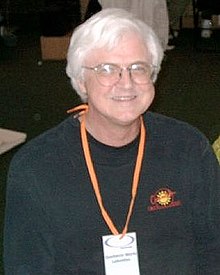Rick Geary
| Rick Geary | |
|---|---|

Geary, photographed at the 2004 Alternative Press Expo (APE) in San Francisco.
|
|
| Born |
February 25, 1946 Kansas City, Missouri |
| Nationality | American |
| Area(s) | Penciller, Inker, Writer |
|
Notable works
|
A Treasury of Victorian Murder (graphic novel series) |
| Awards | National Cartoonist Society Magazine and Book Illustration Award, 1994 |
Rick Geary (born 1946 in Kansas City, Missouri) is an American cartoonist and illustrator.
Rick Geary was born on February 25, 1946 in Kansas City, Missouri. Geary was initially introduced to comics readers with his contributions to the Heavy Metal and National Lampoon magazines. He has also created a number of postcards as well as illustrations for all kinds of publications. Perhaps his most widely circulated illustration is his logo for the audiobook publisher Recorded Books.
Geary's distinctive cartooning style evolved from his early imitations of Edward Gorey. His drawings typically consist of stark clean black lines against a white background, with a total absence of half-tone or shading. Even more distinctive is Geary's method of panel art. Most comics artists will draw several consecutive sequential panels of the same characters in the same setting. Geary, uniquely, almost never devotes two consecutive panels to the same locale or character. This creates a constant impression of jumping from one image to another.
Geary has drawn a variety of solo comic books and graphic novels for various publishers, including adaptations of Great Expectations, The Invisible Man and Wuthering Heights for the revived Classics Illustrated series and a kid-oriented Flaming Carrot spinoff. His most extensive project is his ongoing non-fiction comic book series, A Treasury of Victorian Murder, published by NBM Publishing. The series chronicles such 19th century criminals as H. H. Holmes, Lizzie Borden, Charles Guiteau and Jack the Ripper. In the series, he often uses literary devices characteristic of 19th century popular literature. For example, The Borden Tragedy is narrated through excerpts of a period diary, and The Fatal Bullet didactically contrasts the lives and morality of Guiteau and his victim, President James Garfield.
...
Wikipedia
